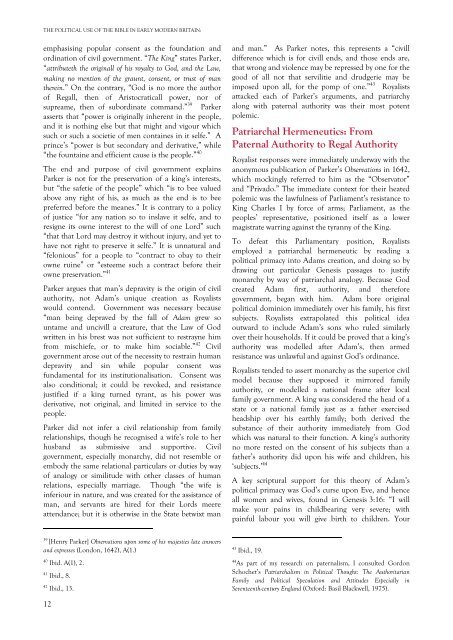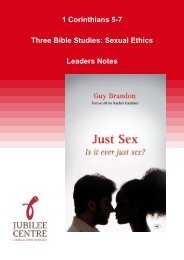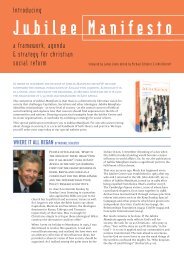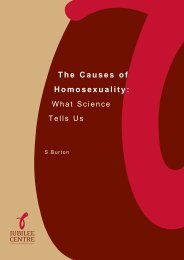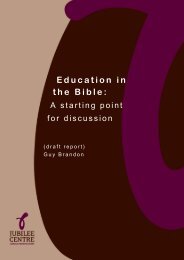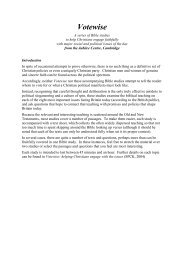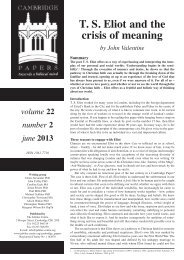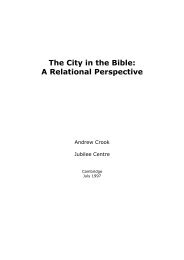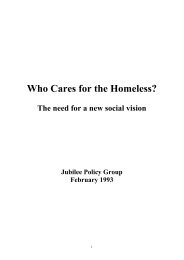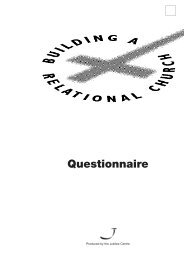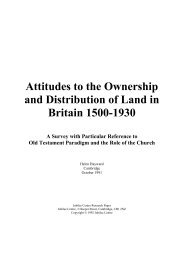Report Template - Jubilee Centre
Report Template - Jubilee Centre
Report Template - Jubilee Centre
Create successful ePaper yourself
Turn your PDF publications into a flip-book with our unique Google optimized e-Paper software.
THE POLITICAL USE OF THE BIBLE IN EARLY MODERN BRITAIN:<br />
emphasising popular consent as the foundation and<br />
ordination of civil government. “The King” states Parker,<br />
“attributeth the originall of his royalty to God, and the Law,<br />
making no mention of the graunt, consent, or trust of man<br />
therein.” On the contrary, “God is no more the author<br />
of Regall, then of Aristocraticall power, nor of<br />
supreame, then of subordinate command.” 39 Parker<br />
asserts that “power is originally inherent in the people,<br />
and it is nothing else but that might and vigour which<br />
such or such a societie of men containes in it selfe.” A<br />
prince’s “power is but secondary and derivative,” while<br />
“the fountaine and efficient cause is the people.” 40<br />
The end and purpose of civil government explains<br />
Parker is not for the preservation of a king’s interests,<br />
but “the safetie of the people” which “is to bee valued<br />
above any right of his, as much as the end is to bee<br />
preferred before the meanes.” It is contrary to a policy<br />
of justice “for any nation so to inslave it selfe, and to<br />
resigne its owne interest to the will of one Lord” such<br />
“that that Lord may destroy it without injury, and yet to<br />
have not right to preserve it selfe.” It is unnatural and<br />
“felonious” for a people to “contract to obay to their<br />
owne ruine” or “esteeme such a contract before their<br />
owne preservation.” 41<br />
Parker argues that man’s depravity is the origin of civil<br />
authority, not Adam’s unique creation as Royalists<br />
would contend. Government was necessary because<br />
“man being depraved by the fall of Adam grew so<br />
untame and uncivill a creature, that the Law of God<br />
written in his brest was not sufficient to restrayne him<br />
from mischiefe, or to make him sociable.” 42 Civil<br />
government arose out of the necessity to restrain human<br />
depravity and sin while popular consent was<br />
fundamental for its institutionalisation. Consent was<br />
also conditional; it could be revoked, and resistance<br />
justified if a king turned tyrant, as his power was<br />
derivative, not original, and limited in service to the<br />
people.<br />
Parker did not infer a civil relationship from family<br />
relationships, though he recognised a wife’s role to her<br />
husband as submissive and supportive. Civil<br />
government, especially monarchy, did not resemble or<br />
embody the same relational particulars or duties by way<br />
of analogy or similitude with other classes of human<br />
relations, especially marriage. Though “the wife is<br />
inferiour in nature, and was created for the assistance of<br />
man, and servants are hired for their Lords meere<br />
attendance; but it is otherwise in the State betwixt man<br />
and man.” As Parker notes, this represents a “civill<br />
difference which is for civill ends, and those ends are,<br />
that wrong and violence may be repressed by one for the<br />
good of all not that servilitie and drudgerie may be<br />
imposed upon all, for the pomp of one.” 43 Royalists<br />
attacked each of Parker’s arguments, and patriarchy<br />
along with paternal authority was their most potent<br />
polemic.<br />
Patriarchal Hermeneutics: From<br />
Paternal Authority to Regal Authority<br />
Royalist responses were immediately underway with the<br />
anonymous publication of Parker’s Observations in 1642,<br />
which mockingly referred to him as the “Observator”<br />
and “Privado.” The immediate context for their heated<br />
polemic was the lawfulness of Parliament’s resistance to<br />
King Charles I by force of arms; Parliament, as the<br />
peoples’ representative, positioned itself as a lower<br />
magistrate warring against the tyranny of the King.<br />
To defeat this Parliamentary position, Royalists<br />
employed a patriarchal hermeneutic by reading a<br />
political primacy into Adams creation, and doing so by<br />
drawing out particular Genesis passages to justify<br />
monarchy by way of patriarchal analogy. Because God<br />
created Adam first, authority, and therefore<br />
government, began with him. Adam bore original<br />
political dominion immediately over his family, his first<br />
subjects. Royalists extrapolated this political idea<br />
outward to include Adam’s sons who ruled similarly<br />
over their households. If it could be proved that a king’s<br />
authority was modelled after Adam’s, then armed<br />
resistance was unlawful and against God’s ordinance.<br />
Royalists tended to assert monarchy as the superior civil<br />
model because they supposed it mirrored family<br />
authority, or modelled a national frame after local<br />
family government. A king was considered the head of a<br />
state or a national family just as a father exercised<br />
headship over his earthly family; both derived the<br />
substance of their authority immediately from God<br />
which was natural to their function. A king’s authority<br />
no more rested on the consent of his subjects than a<br />
father’s authority did upon his wife and children, his<br />
‘subjects.’ 44<br />
A key scriptural support for this theory of Adam’s<br />
political primacy was God’s curse upon Eve, and hence<br />
all women and wives, found in Genesis 3:16: “I will<br />
make your pains in childbearing very severe; with<br />
painful labour you will give birth to children. Your<br />
39<br />
[Henry Parker] Observations upon some of his majesties late answers<br />
and expresses (London, 1642), A(1.)<br />
40<br />
Ibid. A(1), 2.<br />
41<br />
Ibid., 8.<br />
42<br />
Ibid., 13.<br />
43<br />
Ibid., 19.<br />
44 As part of my research on paternalism, I consulted Gordon<br />
Schochet’s Patriarchalism in Political Thought: The Authoritarian<br />
Family and Political Speculation and Attitudes Especially in<br />
Seventeenth-century England (Oxford: Basil Blackwell, 1975).<br />
12


